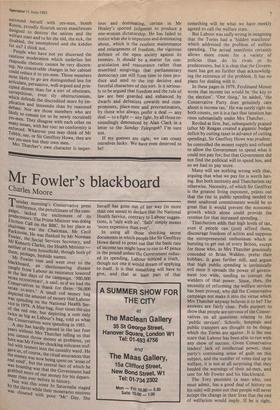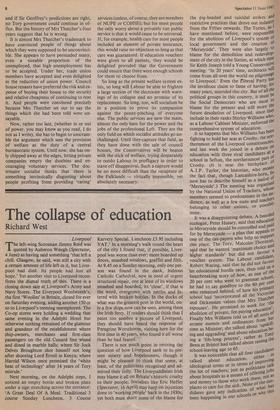Mr Fowler's blackboard
Charles Moore
Tuesday morning's Conservative press . conference, the penultimate of the cam its
- Paigh, lacked the excitement of predecessors. The Prime Minister was doing Election Call on the BBC. In her place as chairman was the Chairman, Mr Cecil Parkinson. He was flanked by Mr Norman Fowler, the Social Services Secretary, and Mr Kenneth Clarke, the Health Minister — neither of them household, though both of them, perhaps, bedside names.
Mr Fowler rose and went over to the blackboard, an electioneering disease caught from Labour as resistance lowered in the last days of the campaign. '500,000 MORE PENSIONERS', it said, as if we had the Conservatives to thank for them: '56,000 MORE NURSES.' A small red money bag depicted the amount of money that Labour vas spending on the National Health Ser- vice in 1979. A blue bag, four times the size of .the ase red one, but depicting a sum only
twic big as Labour's bag, told us what the Conservatives were spending in 1983. A day has hardly passed in the last four Yea without Mrs Thatcher telling us that here you cannot throw money at problems, yet was Mr Fowler chucking suitcases stuf- fed with tenners into the casualty ward. He gave us, of course, the ritual assurances that real need' the money Was now being spent on 'areas of was b , but the central fact of which he oasting was that the Government had grabbed more of our money for his depart- ment than ever before in history. Nor was this some lo Saturnalia staged by the slaves while their monetarist mistress was closeted with poor 'Mr' Day. She herself has gone out of her way (in more than one sense) to declare that the National Health Service, contrary to Labour sugges- tions, is 'safe with us'. 'Safe' simply means 'more expensive than ever'.
In using all those shocking secret documents in which people like Sir Geoffrey Howe dared to point out that the basic rate of income tax might have to rise to 45 pence in the pound unless the Government reduc- ed its spending, Labour noticed a truth, though not one it would dream of applying to itself. It is that something will have to give, and that at least part of that something will be what we have meekly agreed to call the welfare state.
But Labour was sadly wrong in imagining that the Tories had a 'hidden manifesto' which addressed the problem of welfare spending. The actual manifesto certainly allows more room for a variety of policies than do its rivals or its predecessors, but it is clear that the Govern- ment has got no further than acknowledg- ing the existence of the problem. It has no plans for dealing with it.
In these pages in 1979, Ferdinand Mount wrote that income tax would be 'the key to the election'. 'One thing,' he added, 'the Conservative Party does genuinely care about is income tax.' He was surely right on both counts, yet it is a fact that taxation has risen substantially under Mrs Thatcher.
Reviled at first, but, subsequently praised (after Mr Reagan created a gigantic budget deficit by cutting taxes in advance of cutting spending), Sir Geoffrey Howe was prudent: he controlled the money supply and refused to allow the Government to spend what it could not pay for; but that Government did not find the political will to spend less, and so we had to pay more.
Many will see nothing wrong with that, arguing that what we pay for is worth hav- ing. But both necessity and Thatcherism say otherwise. Necessity, of which Sir Geoffrey is the greatest living exponent, points out that the rise in public spending needed to meet unaltered commitments would be so great that it would prevent the economic growth which alone could provide the revenue for that increased spending.
Thatcherism adds that high levels of tax, even if people can (just) afford them, discourage freedom of action and suppress the entrepreneurial enthusiasm which is bursting to get out of every Briton, except for those who, as Mrs Thatcher graciously conceded to Brian Walden, prefer their hobbies. It goes further still, and argues that high public spending is intrinsically evil since it spreads the power of govern- ment too wide, tending to corrupt the wielders of that power. Since, then, the necessity of reforming the welfare services has been proved, why did the Conservative campaign not make it into the virtue which Mrs Thatcher anyway believes it to be? The answers are fairly clear. Polls purport to show that people are nervous of the Conser- vatives on all questions relating to the 'public services'. Schools, hospitals and public transport are thought to be things which the Tories are against. It is the one scare that Labour has been able to run with any show of success. Given Conservative leaders' lack of intellectual power, their party's continuing sense of guilt on this subject, and the number of votes tied up in welfare, it is not at all surprising that they heeded the warnings of their ad-men, and sent for Mr Fowler and his blackboard.
The Tory pessimist (a man who, one must admit, has a good deal of history on his side) will point out that people will never accept the change in their lives that the end of welfarism would imply. If he is right, and if Sir Geoffrey's predictions are right, no Tory government could continue in of- fice. But the history of Mrs Thatcher's four years suggests that he is wrong.
It is almost Mrs Thatcher's trademark to have convinced people of things about which they were supposed to be unconvinci- ble. She appears to have persuaded many, even a sizeable proportion of the unemployed, that high unemployment has to be accepted. Under her, trade union members have accepted and even delighted in the reduction of union power. Council house tenants have preferred the risk and ex- pense of buying their house to the security and relative cheapness of continuing to rent it. And people were convinced precisely because Mrs Thatcher set out to say the things which she had been told were un- sayable.
Now, rather too late, (whether in or out of power, you may know as you read, I do not as I write), she has to begin to unscram- ble the argument which sees the provision of welfare as the duty of a central bureaucratic system. Until now, she has on- ly chipped away at the edges, letting private companies empty the dustbins and en- couraging voluntary services. The doc- trinaire socialist thinks that there is something intrinsically disgusting about people profiting from providing 'caring' services (unless, of course, they are members of NUPE or COHSE); but for most people the only worry about a privately run public service is that it would cease to be universal. If, for example, health care for most people included an element of private insurance, this would raise no objection so long as that care was guaranteed. If education vouchers were given to all parents, they would be delighted provided that the Government could ensure that there were enough schools for them to choose from.
So long as the present welfare system ex- ists, so long will Labour be able to frighten a large section of the electorate with warn- ings of its collapse and no promise of its replacement. So long, too, will socialism be in a position to prove its compassion against the penny-pinching of everyone else. The public services are now the main, almost the only base for the power and the jobs of the professional Left. They are the only field on which socialist attitudes go un- challenged. Until they capture that field, as they have done with the sale of council houses, the Conservatives will be beaten with the stick of welfare, trying desparately to outdo Labour in profligacy in order to stave off disapproval. Such a capture would be no more difficult than the recapture of the Falklands — virtually impossible, yet absolutely necessary.











































 Previous page
Previous page